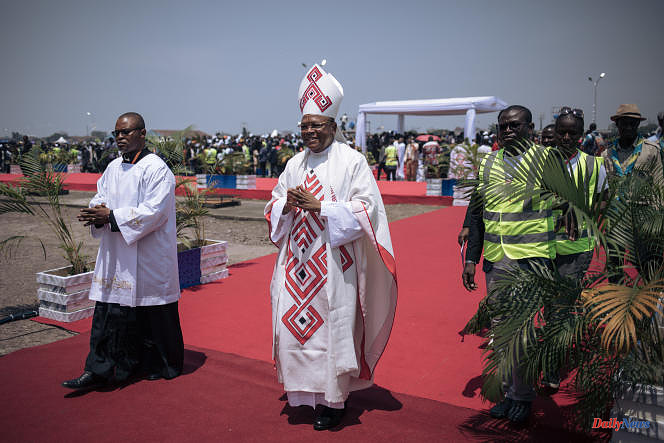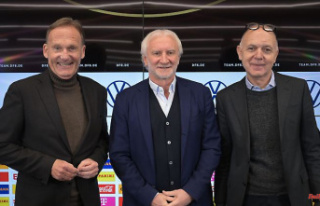“Fatshi [Felix Thisekedi], know that your mandate is coming to an end! This slogan was chanted several times at the Martyrs stadium, on February 2 in Kinshasa, by young Catholics gathered to follow a teaching by Pope Francis. The sovereign pontiff began his 40th apostolic journey on January 31 in the Democratic Republic of Congo (DRC), where he multiplied messages of peace and forgiveness while denouncing the violence and "economic colonialism" that the country is suffering.
This tune had already been sung in the past against former President Joseph Kabila, who was then trying to run for a third term in violation of the Constitution. This time, he expressed the disappointment of part of the population who did not see the many promises of a better life made during Félix Tshisekedi's electoral campaign and after his election in 2018 come true. several controversies between the Union for Democracy and Social Progress (UDPS), the ruling party, and the Catholic Church, a major political and social actor in the country, while the next presidential election is to take place on December 20 in a countries where elections are regularly contested.
Ten months from the end of Félix Tshisekedi's first five-year term, the daily life of the Congolese has not improved much: the depreciation of the Congolese franc against the American dollar continues; free primary education, a long-awaited measure, is progressing with difficulty; strikes among teachers and doctors continued; the security situation deteriorated in the east and a conflict between the Teke and Yaka communities rocked the west of the country last fall; finally, several members of the government have been marred by corruption scandals.
The cardinal's "political" remarks
In this context, the images of a crowd of more than 80,000 people, some of whom singing a song hostile to the maintenance of the president, greatly displeased the UDPS. Some of its members saw it as a plot by Catholic officials to destabilize the power of the head of state. “They said it was a communication between the Holy Father and Catholic youth. Instead of relaying the message 'All reconciled in Jesus Christ' [theme of the pope's trip], they spoke for those [opponents] who no longer have any political future,” the evening said. even Augustin Kabuya, secretary general of the party, in front of some supporters.
This criticism is in addition to the reproach made to Cardinal Fridolin Ambongo, Archbishop of Kinshasa, after his speech delivered at Ndolo airport on February 1. He then declared that "the electoral period is often a source of social and political tension" and expressed the hope of "seeing free, transparent, inclusive and peaceful elections". Remarks that the vice-president of professional youth of the UDPS, Luc Kabunangu, described as "political" during an interview with a local media. At the same time, a video showed UDPS supporters chanting: “Ambongo made children he abandoned in Rwanda. Felix is the chef. »
An attack to which Mgr. Donatien Nshole, secretary general and spokesperson for the National Episcopal Conference of Congo (Cenco), responded during a press briefing on February 5: "The cardinal is a pastor loved by thousands of faithful in this country. By insulting him, you offend everyone who loves him. And politically, it is not profitable. The cleric stressed that there was no problem between the Church and the Head of State, and even less between the latter and Cardinal Ambongo.
Tensions dating back to 2018
For Trésor Kibangula, analyst at the Congolese Institute for Research on Politics, Governance and Violence (Ebuteli), these controversies are part of the Congolese political game: “We are facing two camps with divergent interests. On the one hand the UDPS, which wants to retain power and defend its champion, and on the other the Catholic Church, which would like this process of retaining power to go through free and transparent elections. For him, "the pope's visit was useful to many stakeholders", each finding in the visit and the words of Francis something to consolidate their positions. This visit also reminded those in power in Kinshasa of the importance and influence of the Catholic Church, which feels invigorated by its ability to mobilize.
Since the start of the electoral process, Catholics, like Protestants, part of civil society and the opposition, have struggled to make themselves heard. The power proceeded to many passages in force, in particular on the choice of Denis Kadima at the head of the Independent National Electoral Commission (CENI). "We, the Catholic Church and the Protestant Church, which constitute 90% of the population of the Democratic Republic of the Congo, we told President Félix Tshisekedi that it was not a good choice", declared in October 2021 the Archbishop of Kinshasa. A rejection justified by "the observation of the dependence of the candidate-president [of the CENI] on the power in place", according to Bishop Nshole.
Tensions between the UDPS and the Church date back to 2018. The latter claimed to hold other results than those which designated Félix Tshisekedi winner of the presidential election against Martin Fayulu. "After several weeks of protests, the Catholic Church had decided to move on, because it also wanted to take advantage of the peaceful alternation at the top of the state and to commit to more transparency during the next electoral process", recalls Trésor Kibangula. For the latter, engaging in a standoff against the Church is not a good idea. "The recent political history of the DRC has shown that it is always better to have the Church on its side and I think the UDPS is aware of this", underlines the analyst.












